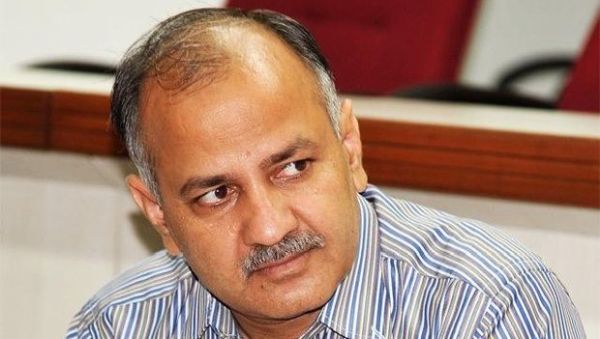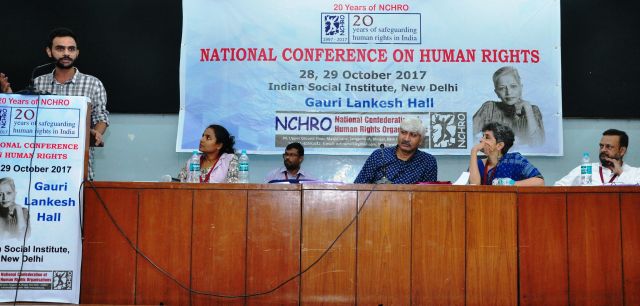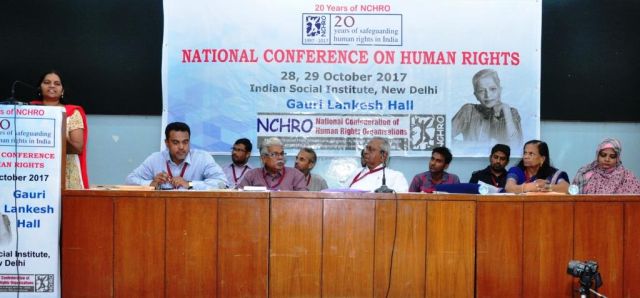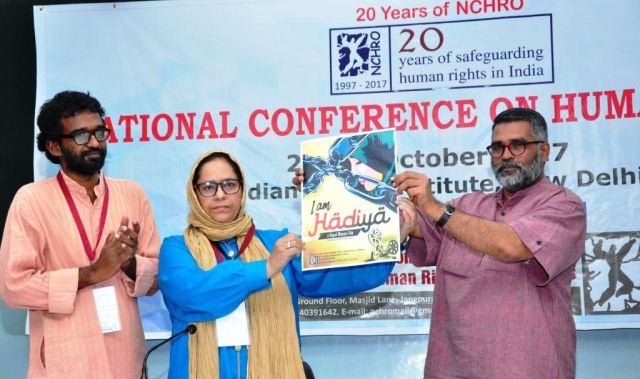
by Editor | May 25, 2021 | News, Politics

Manish Sisodia
New Delhi : Delhi Deputy Chief Minister Manish Sisodia on Wednesday challenged the state governments led by BJP and Congress to compete with his state’s education “revolution”.
He also challenged the BJP-ruled MCDs for a comparison with the schools of the Delhi government.
“Compete with the work done in education sector by our government. Let’s start today and then compare after a year or two. This competition will ultimately benefit the students of the country providing them with good schools,” Sisodia, who also holds the Education portfolio, told media here.
His remarks come in the wake of criticism that his government received from the opposition on its performance in the field of education among others.
State BJP chief Manoj Tiwari on November 24 said that Chief Minister Arvind Kejriwal failed to deliver on his poll promises that he would improve education, while Congress’ Delhi unit President Ajay Maken also slammed the Delhi government, saying the number of students and its results have gone drastically down in last three years.
Sisodia hit back on Wednesday claiming that government schools are being shut down and private schools are increasing in states led by BJP and Congress.
“I appreciate that the important matter of education is being discussed by the politicians who keep discussing issues of ‘shamshan’ and ‘kabristaan’,” he said.
He further said that both BJP and Congress “did nothing in the education sector” and rather played in the hands of the private school lobby.
Referring to the data of the Education Department, he said that the transition loss from Class 10 to Class 12 came down in the two years of AAP’s rule in Delhi.
“While the transition loss in 2013-14 was 6,2,158, it has come down 2016-17 to 1,8,405.”
He also pointed towards the increase in expenditure on school infrastructure, which, he said, has gone up to Rs 1,229 crore in 2016-17 from Rs 210 crore in 2012-13.
“We changed the way education sector worked in Delhi. The schools which were dilapidated and were not maintained, get whitewashed every year now, and drinking water and sanitation has been taken care of.
“Four-five years back when we started talking on wide-spread corruption, the political discourse shifted from caste, religion to issues like corruption. I am sure education will become a topic in national politics in the coming years,” he added.
—IANS

by Editor | May 25, 2021 | Markets, Technology
 By Nishant Arora,
By Nishant Arora,
New Delhi : With emerging technologies like Artificial Intelligence (AI), Internet of Things (IoT) and Big Data Analytics knocking at India’s doors, the country needs to sow the learning seeds early — in the classroom — and China and Turkey can show the way, top global Intel executives have said.
The world has realised what is coming its way in the next 10-20 years and has already begun modernising classrooms at schools to prepare a technology-ready workforce.
“The Chinese and Turkish authorities have given kids IoT-enabled devices in millions of schools. Every student has a device connected to an intelligent whiteboard at the front of the classroom. There are teacher-controlled devices too. The curriculum is designed for that kind of environment. This is the future of education,” Joe D. Jensen, Vice President, Internet of Things (IoT) Group, and General Manager, Retail Solutions Division at Intel, told IANS.
“Intel has installed 400,000 IoT-enabled connected devices for schools in Turkey, a million-and-a half in Chinese schools and another million to go in China in the next two years,” Jensen informed.
Technology can do wonders in providing a great educational experience and create a pool of talent for these disrupting technologies.
“In China, the newest innovation is that there are eight video cameras and a series of microphones in a classroom at certain private schools and colleges. The videos of the classroom activities are recorded daily. Parents can later log on and see the student-teacher interaction,” Jensen told IANS.
For Lisa Davis, Vice President and General Manager, IT Transformation for Enterprise and Government at Intel, while India is at the cusp of dramatic changes in delivering next-generation education, it is also set to learn new ways to infuse technology in many other sectors.
“Not just education, we are looking at the financial services, transportation, retail and health-care sectors too in India. The next big wave is coming in video surveillance and the security sector, and our teams are engaged with the stakeholders in the country,” Davis told IANS.
Intel has also pushed the envelope towards creating a modern workforce in India. In April this year, Intel made a commitment to democratise AI in the country by training 15,000 developers and engage with not just businesses but also the government and academia to enable the adoption of AI.
Intel India has trained 9,500 developers, students and professors in the past six months.
The chip giant has collaborated with 40 academic institutions that are using the technology for scientific research and 50 public and private organisations across e-commerce, health-care, technology, defence, and banking and financial services.
Intel India has also launched an initiative to strengthen the use of technology in the country’s education ecosystem. It is collaborating with leading device manufacturers, education digital content publishers and education solution providers to build end-to-end solutions that promote the use of technology.
The company will then help deploy management solutions for schools, classrooms, content and learning, and also manage student information systems.
There is an Intel India Maker Lab in Bengaluru to drive the innovation ecosystem in the country. The lab offers access to start-ups of hardware and software development kits, reference boards, design collaterals, test and debugging equipment. It provides technical support for design, development and testing products.
“India is at the cusp of a technology boom, but needs training and teaching right from the beginning to prepare a future digital workforce,” Davis stressed.
(Nishant Arora can be contacted at nishant.a@ians.in)
—IANS

by Editor | May 25, 2021 | News
 By Maeeshat.in,
By Maeeshat.in,
Patna: Rahmani Program of Excellence, the parent body of Rahmani-30 has announced that 100% of students have cleared National Stock Exchange Academy’s Certification in Financial Markets (NCFM) certification.
According to the representative of Rahmani Program of Excellence, this is first of the many successful steps that the center has in the plan for its commerce students.
Given the difficulty of the content and the effort required to clear the test this is a huge achievement for both students, and the local communities that require this skill-set but the market does not have the requisite quality. Obtaining this certification even before completing their senior secondary high school is all the more remarkable and adds to the market value of the students and the prestige of the organization.
The famous Rahmani-30 which qualified 75 students last year at the IIT JEE Advanced is the same organization that qualified 100% of its female students at NEET where 22/31 students were above 90% percentile. Creating a program for the underestimated and mostly misunderstood commerce program was not only a challenge but also a risk to the value of excellence that Rahmani Program of Excellence has come to epitomize. However, given the condition of the field, the management decided to establish a center and incorporate training that are usually postponed till after high school or even graduation. These extra courses include Chartered Accountant Foundation, NCFM Foundation besides others.
market liberalization and the resultant implementation of new laws have started to shift the perception of the society, and students are realizing the potential of this field. Rahmani Program of Excellence envisions a great value for its students in this education stream as these students will become the navigators of the financial engine not only their state but the country as well.
Rahmani Program of Excellence (Rahmani-30) has issued a communication to inform students, parents, and teachers that the entrance test for the new session of 2018-20 will be held on Sunday the 19th of November, 2017. This test will be open to both female and male students. This entrance test will be used to prepare students for the IIT-JEE, NEET, CA, CS, CLAT and NDA examinations. On behalf of Rahmani-30, this entrance test will be conducted in 21 states and more than 122 districts. Further information such as a list of centers, registration form, time of the examination, etc. are available at www.rahmanimission.org
Last date for registration for the session 2018-20 for class 10th in 2018 has been extended from 10th November 2017 to 14th November 2017 in accordance to the request made by Volunteers, Teachers and Principals of our Test Centers.
Hazrat Ameer-e-Shariat Maulana Mohammad Wali Rahmani Sahib has urged students, teachers, the administrators of schools and the testing centers to deem this competition as our collective step towards excellence in education. He correlated the year over year rising numbers of students who apply to Rahmani-30 as an indication of rising hope among students which is the true purpose of this movement. He stated that Alhumdulillah, students are feeling more hopeful and now have begun to realize that even they have the ability to conquer the toughest competitions such as the IIT, Medical, Olympiad and others. He appealed to the students to consider this competition as a celebration of excellence and to participate in it with the zeal to continue to raise our collective educational excellence.
Public Folder Rahmani-30 – LINK
Link to National Stock Exchange Certificates – LINK
For Updates:
http://rahmanimission.org
http://t.me/rahmaniprogram
https://groups.google.com/forum/#!forum/rpeinfo

by Editor | May 25, 2021 | News, Politics

Student leader Umar Khalid addressing the NCHRO National Conference in New Delhi while seen seated on the dais are (from left to right) Padmashree, Adv. A. Mohammed Yusuff, Prof. Apoorvanand, Prof. Nivedita Menon and Syed Zubair Ahmed.
By Pervez Bari,
New Delhi : Prof. Nivedita Menon of Jawaharlal Nehru University, (JNU), has said that the RSS is trying to change the social and cultural ambience of the universities. The new Vice Chancellors appointed by the NDA government try to introduce the culture of “Rashtravaad” through fair or fouls means with the help of the ministers concerned.
Prof. Nivedita made the above observation while delivering her keynote address in the opening session on the second day of the two-day (October 28 & 29, 2017) National Conference on Human Rights organized by National Confederation of Human Rights Organizations, (NCHRO). The sessions were held in the Gauri Lankesh Hall, at Indian Social Institute, New Delhi. Prof. Apoorvanand of Delhi University, (DU). chaired the first session on “Universities and Academic Freedom”. Ms Padmashree, Joint Secretary of NCHRO, Karnataka Chapter, welcomed the gathering.
Umar Khalid, the eminent student leader from JNU Delhi, underlined the need for new student politics different from the traditional left.

Veteran journalist V.T. Rajshekar addressing the NCHRO’s National Conference in New Delhi.
While Syed Zubair Ahmed, Editor-in-chief of web news portal www.muslimmirror.com, putting forth his views on the topic said: “A university is the place where fascism gets tough resistance, that’s why universities are the main target of fascist forces. When there was no opposition to the RSS controlled BJP government, the main opposition party Congress was nowhere in the scenario and was on ‘watch and wait’ mode. It was JNU, its students and faculty members who were playing the active role of opposition and countering the fascist regime tooth and nail”.
The chairperson of the NCHRO Prof. A. Marx presided over the second session “Victims of Rights Violations and Activist Meet’’. It was inaugurated by eminent journalist, Editor of Dalit Voice V.T. Rajshekar. “We are meeting here today in a very dangerous of political climate. Brahmanism is the enemy of the country. Muslims are not foreigners. Dalit-Muslim unity is need of the hour. Muslim leadership should initiate this task” he said. Adv. Shakeel Ahmed, National Executive Member, NCHRO also spoke.

Mrs. Vasantha Saibaba, wife of Delhi University’s jailed Prof. G. N. Saibaba, addressing the NCHRO’s National Conference in New Delhi.
The victims of rights violations, Mrs. Vasantha Saibaba, the wife of Dr G.N. Saibaba, who is currently in Nagpur Central Jail; Amanullah Ansari, Kota, Rajasthan; Zakir Thyagi, Muzaffarnagar, UP; Dr. Kusum Megwal, Udaipur Rajasthan; Irshad Ali, Delhi; Mohammed Elyas, Baran, Rajasthan, Sadaf Mushrraf. (Sister of missing JNU student Najeeb), Delhi shared their pain with the participants.
The activists’ session under the banner “Rights in the Modern World and the Problems of Appropriation” focused on the need for better legal and political coordination among different rights bodies.
The documentary on Dr. Hadiya issue (Kerala) titled “I am Hadiya” produced by noted film maker Gopal Menon was symbolically released on the second day of the conference.
Adv. K. P. Mohammed Shareef, Vice Chairperson of NCHRO, chaired the valedictory session. Adv. Amit Srivastav, State Vice-President, NCHRO, Delhi Chapter; delivered welcome address.
Muhammed Ali Jinnah, General Secretary, Popular Front of India, speaking on the occasion said that we live in a phase, wherein undeclared emergency is in place and notable writers and thinkers like Dabolkar, Pansare, Kalburgi and Gauri Lankesh were shot to death. Muslims and Dalits are being lynched for eating the food of their choice. At this juncture there is a need to fight for Human Rights and justice. As a human being, who has to be true to his conscience and safeguard the justice, it’s the right time for every Indian to take a right decision. In that way, we have to congratulate NCHRO, which works tirelessly in the human rights front, he said.
Jinnah said the Indian Constitution is a beacon, comparatively. But it is used to arrest the people instead of safeguarding them. Muslims, Dalits and Tribals are affected the most. The condition of Muslims is pathetic. The community which is denied reservation in all the fields is provided reservation in the jails, well above the mark. The Muslims who constitute 14.2% of the population constitute more than 30% in the prisons. The Muslims who spend 8 years, 10 years and 14 years in the jails are later acquitted as innocent by the courts. Why were they sentenced? Who will return their youth and dignity? Who will answer the questions of these hundreds of youth in this democratic nation? What will be our role in this case?, he questioned.
The right wing fascists who are in power are now targeting the anti-fascists, those who have difference of opinion and those who fight for Human Rights. What will be our role against this fascist witch-hunt?
The Government has got a draconian weapon called UAPA to murder the Human Rights. The manner in which UAPA has been implemented shows its dangers. Moreover the Government is using this act to portray the Muslim majority areas as the dens of terrorism. What can we do for this?

Reny Ayline, Secretary NCHRO; looks on as Ms Anjum Zamrud Habib, Writer & Activist, Kashmir; and Vilayodi Shivankutty, Kerala Chapter President, NCHRO release the poster of documentary titled “I am Hadiya” produced by noted film maker Gopal Menon in New Delhi.
Hence, the call for human rights should be echoed across the nation and it’s the need of the hour. The true spirit of our Constitution can be restored only if we fight effectively for the Human Rights. Let the NCHRO, which has 20 years experience in the human rights field guide the nation in the journey for human rights, Jinnah appealed.
Prof. A. Marx, Chairperson of NCHRO, Prof. P. Koya, General Secretary, NCHRO; also spoke in the valedictory session.
Meanwhile, fifteen resolutions on different issues were passed in the conference. Ansar Indori, State General Secretary, NCHRO, Delhi chapter; proposed the vote of thanks.
The activists from 18 states viz. Kerala, Tamil Nadu, Pondicherry, Karnataka, Andhra Pradesh, Telangana, Maharashtra, Goa, Madhya Pradesh, Rajasthan, Haryana, Delhi, Jammu & Kashmir, Uttar Pradesh, Bihar, Odisha, West Bengal and Assam participated in the conference.

by Editor | May 25, 2021 | News
 Sonepat : Legal education in India has transformed from its early origins as a professional practice of law in courts to an autonomous discipline of law that fulfils a broader set of social, economic and educational goals and aspirations, the founding Vice Chancellor of the O.P. Jindal Global University C. Raj Kumar said at a function to mark the 200th year of the Harvard Law School.
Sonepat : Legal education in India has transformed from its early origins as a professional practice of law in courts to an autonomous discipline of law that fulfils a broader set of social, economic and educational goals and aspirations, the founding Vice Chancellor of the O.P. Jindal Global University C. Raj Kumar said at a function to mark the 200th year of the Harvard Law School.
“The evolution of legal education in India has raised the standards of the legal profession and has further accentuated the impact of economic globalisation in a range of legal services. This trend will continue as the new generation of law schools in India such as the National Law Schools and a few select not-for-profit private law schools such as the Jindal Global Law School are raising academic standards, providing research opportunities to faculty and students and contributing to the knowledge creation and publications, while training the next generation of global lawyers” a statement issued here quoted him as saying.
Legal education and legal profession in India need to drive the agenda for social, economic, and institutional reforms. The globalisation of legal profession has impacted the nature and context of legal practice in India but a vast number of law schools and lawyers are not prepared to effectively address this change, he added.
Taking the Jindal Global Law School as a case study, Kumar articulated the vision for global legal education and how developing countries in Asia and Africa need to play a leadership role in the establishment of standards and participation in providing high quality legal services.
“But unlike the law schools in the developed world, legal education in Asia and Africa will have a strong dimension of social engineering and seeking the role of law as an instrument of social change. It will need to address issues of systemic and institutionalised forms of injustices perpetrated due to corruption, discrimination and authoritarianism.
“Legal education and the legal profession is called upon to make democracies function effectively on the basis of the rule of law and good governance so that the constitutional goals do not remain as unachievable rhetoric but become a reality through ensuring greater degree of transparency and accountability. This is a particularly significant role that law ought to play in countries in Asia and Africa such as India,” Kumar noted.
Kumar, a Rhodes Scholar and an alumnus of Harvard Law School, was the only lawyer and legal scholar from India to be invited to speak on special occasion October 26-27.
JGU was the only Indian university and Jindal Global Law School the only Indian law school at the event, which witnessed participation of over 250 speakers from around the world.
—IANS








